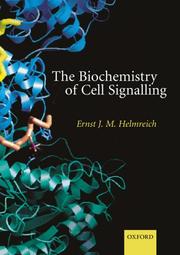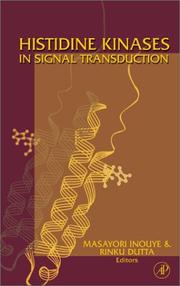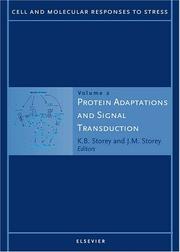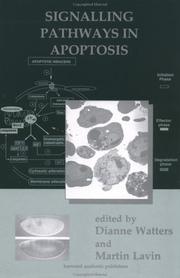| Listing 1 - 10 of 175 | << page >> |
Sort by
|

ISBN: 0198508204 9780198508205 Year: 2001 Publisher: Oxford Oxford university press
Abstract | Keywords | Export | Availability | Bookmark
 Loading...
Loading...Choose an application
- Reference Manager
- EndNote
- RefWorks (Direct export to RefWorks)
Book
ISBN: 0128123524 0128123516 9780128123522 9780128123515 Year: 2018 Publisher: London, United Kingdom
Abstract | Keywords | Export | Availability | Bookmark
 Loading...
Loading...Choose an application
- Reference Manager
- EndNote
- RefWorks (Direct export to RefWorks)
Book
ISBN: 0128170875 0128170867 9780128170878 9780128170861 Year: 2020 Publisher: Amsterdam, Netherlands : Elsevier,
Abstract | Keywords | Export | Availability | Bookmark
 Loading...
Loading...Choose an application
- Reference Manager
- EndNote
- RefWorks (Direct export to RefWorks)
Book
ISBN: 0128178825 0128178833 9780128178836 9780128178829 Year: 2021 Publisher: London : Academic Press, an imprint of Elsevier,
Abstract | Keywords | Export | Availability | Bookmark
 Loading...
Loading...Choose an application
- Reference Manager
- EndNote
- RefWorks (Direct export to RefWorks)

ISBN: 128105691X 9786611056919 0080534015 0123724848 Year: 2003 Publisher: Boston ; Amsterdam : Academic,
Abstract | Keywords | Export | Availability | Bookmark
 Loading...
Loading...Choose an application
- Reference Manager
- EndNote
- RefWorks (Direct export to RefWorks)
Living cells are constantly sensing environmental changes, and their abilities to sense these changes and adapt to them are essential for their survival. In bacteria, histidine kinases are the major sensors for these environmental stresses, enabling cells to adapt to new growth conditions. Written by leading experts in the field, this book provides an up-to-date and comprehensive review on the structure and function of histidine kinases. It also provides extensive information on the physiological roles of histidine kinases in bacteria and eukaryotes. An an essential reference f
Protein kinases. --- Cellular signal transduction. --- Cellular information transduction --- Information transduction, Cellular --- Signal transduction, Cellular --- Bioenergetics --- Cellular control mechanisms --- Information theory in biology --- Protein kinase --- Protein phosphotransferases --- Phosphotransferases

ISBN: 128104850X 9786611048501 0080539963 0444507590 9780444507594 9780080539966 9781281048509 Year: 2001 Publisher: Amsterdam New York Elsevier
Abstract | Keywords | Export | Availability | Bookmark
 Loading...
Loading...Choose an application
- Reference Manager
- EndNote
- RefWorks (Direct export to RefWorks)
This volume of Cell and Molecular Responses to Stress has two broad themes: an examination of selected protein adaptations that support stress tolerance and an analysis of signal transduction systems, those critical links between the perception of stress and the activation of the coordinated metabolic responses that ensure survival. Several chapters deal with adaptive responses to environmental cold temperature and highlight novel advances in mammalian hibernation, low temperature enzyme function, cold-shock and antifreeze proteins, and freezing survival. Other chapters stretch out to
Proteins. --- Cellular signal transduction. --- Cellular information transduction --- Information transduction, Cellular --- Signal transduction, Cellular --- Bioenergetics --- Cellular control mechanisms --- Information theory in biology --- Proteids --- Biomolecules --- Polypeptides --- Proteomics
Book
ISBN: 0128194049 9780128194058 0128194057 9780128194041 Year: 2020 Publisher: London, England : Academic Press,
Abstract | Keywords | Export | Availability | Bookmark
 Loading...
Loading...Choose an application
- Reference Manager
- EndNote
- RefWorks (Direct export to RefWorks)
Book
ISBN: 0128052392 0128048239 Year: 2016 Publisher: Amsterdam, Netherlands : Academic Press,
Abstract | Keywords | Export | Availability | Bookmark
 Loading...
Loading...Choose an application
- Reference Manager
- EndNote
- RefWorks (Direct export to RefWorks)
Book
ISBN: 1628080000 9781628080001 1626189927 9781626189928 Year: 2013 Publisher: New York
Abstract | Keywords | Export | Availability | Bookmark
 Loading...
Loading...Choose an application
- Reference Manager
- EndNote
- RefWorks (Direct export to RefWorks)
Labyrinth (Ear) --- Cellular signal transduction. --- Cellular information transduction --- Information transduction, Cellular --- Signal transduction, Cellular --- Bioenergetics --- Cellular control mechanisms --- Information theory in biology --- Inner ear --- Internal ear --- Ear --- Hearing

ISBN: 0429176910 148229821X 1280071710 9786610071715 0203303652 9780203303658 9789057023927 905702392X 905702392X 9781482298215 9781280071713 6610071713 9780429176913 Year: 1999 Publisher: Amsterdam Harwood Academic
Abstract | Keywords | Export | Availability | Bookmark
 Loading...
Loading...Choose an application
- Reference Manager
- EndNote
- RefWorks (Direct export to RefWorks)
Apoptosis, or programmed cell death, is a necessary process by which a cell may die without adversely affecting its environment. It plays a crucial role in normal development, and in the body's defence mechanisms against disease. Too much cell death is destructive, leading to neurodegenerative diseases and impaired development. Conversely, too little cell death can lead to an increased susceptibility to cancer and sustained viral infection. Apoptosis is a matter of balanceDramatic progress has been made in the study of apoptosis over the past decade. One of the most rapidly expanding knowl
| Listing 1 - 10 of 175 | << page >> |
Sort by
|

 Search
Search Feedback
Feedback About UniCat
About UniCat  Help
Help News
News